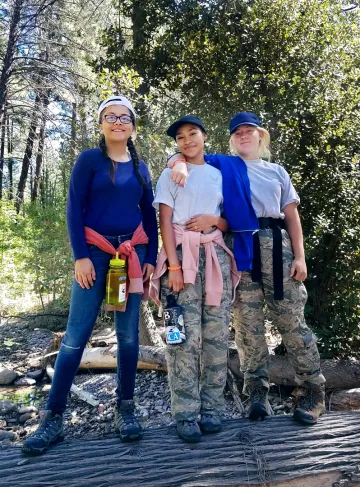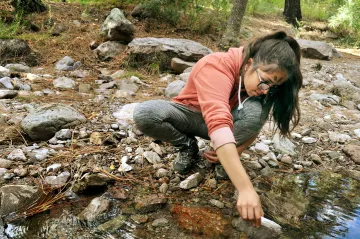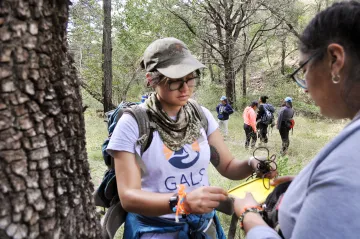Confidence and Camping
Southern Arizona girls learn place-based science through outdoor education.

Girls on outdoor Adventure for Leadership and Science, or GALS, offers young women from underfunded Tucson high schools the opportunity to gain science proficiency while exploring the outdoors.
/ Image provided by GALS
In the crisp fall air of the Chiricahua Mountains in Southern Arizona, a group of high school-aged girls strings a net across a stream to catch insects and minnows for study. They dig up soil samples, measure trees and marvel at the wonders of the natural world together. For many of them, this is their first time hiking, camping or being away from home — not to mention being without internet or cellphone service for multiple days.
This off-grid experience targeted at young women from underfunded Tucson high schools is organized by Girls on outdoor Adventure for Leadership and Science, or GALS, a program directed by Elise Gornish, a specialist in ecological restoration from the University of Arizona’s Cooperative Extension in the College of Agriculture and Life Sciences. Established by Gornish in 2018, GALS aims to increase science proficiency and support self-awareness, teamwork and leadership skills.
“GALS engages participants as scientists and thinkers,” Gornish says. “The point is to get them involved, discussing and doing science, talking to female scientists, and learning about local ecology. But there’s also the component of enhancing their leadership skills and their confidence. Studies have shown that girls don’t pursue STEM because they don’t think they’re smart enough for it. It’s a lack of confidence.”
Gornish can relate and is passionate about STEM inclusion. “I always thought I was too dumb to be in science, and my home life and culture reinforced that,” Gornish says. “It wasn’t until I was in my late 20s that I got back into science. Representation and opportunities in science matter. Having access to experiences like GALS can be formative.”
Throughout the weeklong camping trip, the program brings female scientists and other women working in STEM to speak to the participants and lead hands-on activities. Speakers include soil scientists, forest rangers and even scientific artists. The “GALS” learn about local ecology through projects like making plant presses and identifying flora. They also hear from a large-mammal expert to learn about native animals and the trail cameras set up to capture pictures of creatures prowling near their campsites.
“I don’t necessarily want the girls to all want to be scientists,” Gornish says. “I just want them to come back and say, ‘I can do science if I want.’ It’s about giving them the confidence. From birth, girls are told they don’t belong in certain spaces, so I asked myself, ‘What can I do in my little, tiny life to mitigate some of that?’ And this is it.”
As part of the program, each participant is tasked with executing her own scientific experiment and spends the week collecting data. Students have gathered data on aquatic insects in ponds versus creeks and the ratio of different types of rocks in a stream. On returning to Tucson, the participants create posters of their findings and give presentations to a group of peers and family members. For many of them, it is their first time practicing public speaking.

/ Image provided by GALS
“Last year the girls were presenting their posters, and someone in the audience asked, ‘What was the biggest thing that happened to you this week?’ And one girl responded, ‘Now I really believe I can do anything,’” Gornish says. “There are few things in my life so evident that I’m providing a valuable service to people. It makes me feel really good.”
“The end of the trip is bittersweet,” says Kaitlyn Gahl, a master’s student in fisheries management and conservation in the UArizona School of Natural Resources and the Environment. She has been working as a trip leader with GALS for two years. “At the start of the trip, you see these girls that are really shy and kind of uncomfortable or even scared. They’re away from their families, with a bunch of strangers. And by the end, they’re all best friends and so confident. And they all have a science project they’ve completed and are proud of. It’s really cool seeing the transformation in just one week.”
Each year, four undergraduate or graduate students lead the GALS camping trip, helping to direct activities and keep the participants safe in the wilderness. Former GALS leader Marci Caballero-Reynolds, who graduated in 2020 with a degree in natural resource management and now is a recruiter for Arizona Conservation Corps, found it fulfilling to work with young people who had never camped or had access to outdoor spaces.
“There’s just moments of joy, where they’ll say, ‘I didn’t realize you could dig up soil and find all this stuff or find all these microorganisms under a rock,’” she says. “You put the girls in a new situation, and from the beginning they are curious about everything, and you can see the curiosity just continue to grow. We expose them to new worlds they could potentially pursue.”
GALS also offers a mentorship program that matches participants with female STEM graduates and postdoctoral candidates at UArizona. Mentors answer questions, act as sounding boards and help with the college application process. “A lot of these participants are coming from schools that don’t have people there to help them apply for college, and most of them will be first-generation college students,” Gornish says.

/ Image provided by GALS
Mentors and mentees can also attend organized events together, such as touring the Tucson Botanical Gardens and learning from a pollinator expert. Thanks to philanthropic support from grants and private donors, all programming costs, including supplies associated with the camping trip, are free to participants. Faculty have even donated more than 70 pairs of hiking boots to GALS.
“It’s really nice to be reminded of community and how people want to help,” Gornish says. “My dream would be to secure enough funding so that there could be a GALS college scholarship for some of the participants. A lot of these girls come from lower-income families, and the cost of college is out of reach.”
Not all GALS participants pursue STEM careers, but the impact on their self-esteem is profound. Caballero-Reynolds remembers how one participant, after days of hiking, camping and other activities, shared that for the first time she felt she could survive on her own.
“It was just as empowering for me to hear,” Caballero-Reynolds says. “The stigma that girls can’t pick up heavy things or have survival skills was broken down. They realize that they’re resilient.”
Gahl adds, “What they get the most out of it is the confidence — the confidence to be themselves and be a woman in a difficult world, and go forward and kick ass.”
